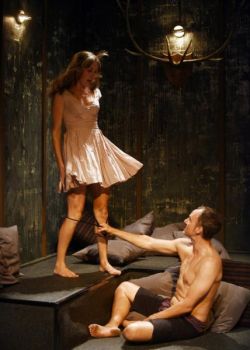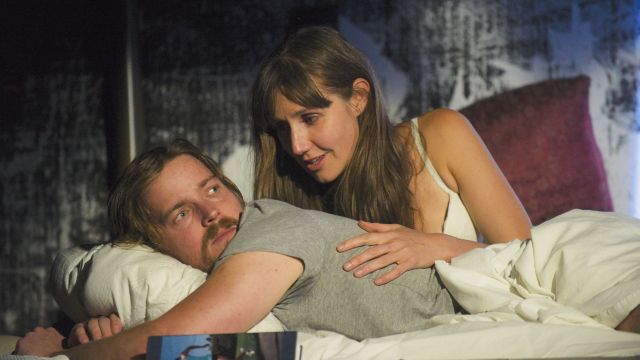The Village Bike
Red Stitch kicks off the new year with a nicely focussed production of Penelope Skinner’s award winning play about sexual obsession and gender hypocrisy. It’s a bold play, and perhaps shocking to the elderly Sunday night audience I shared a performance with. Nevertheless, it has relevant things to say beneath the sledge-hammer approach and shock tactics of the text itself.
Becky (Ella Caldwell) and John (Richard Davies) have moved to the country, to a cottage with clanging pipes, to await the birth of their first child. But while hormones are making Becky randier than usual, John is depriving her of any sexual contact. He says it’s because he’s afraid of hurting the baby….but is that really the reason? Becky buys a bike from a virile middle-aged man, Oliver (Matt Dyktynski) who clearly sees riding a bike as a euphemism. And then there’s Mike (Syd Brisbane), a sad excuse of a man who attends to plumbing and not much else in life since the death of his wife. Neighbour Jenny (Natasha Herbert) offers traditional philosophy and tries to hide her resentment that her husband is never home. And then there’s Oliver’s surprisingly cool European wife (Olga Makeeva).
 When Becky becomes a predatory hunter for sex anywhere she can get it, it provides some fine British comedy innuendo lines, but doesn’t explore female sexuality with any depth. In fact, it’s a shallow play that could annoy some feminists (as did Thelma and Louise) when Becky can’t keep her fling with Oliver at arm’s length and resorts to stalking him…not because she loves him, but because she craves the sex. Are all women that stupid in Skinner’s eyes? And do women need sex as often as men? (Of course they do – in some cases) and is it okay to throw fidelity, truth, out of the window just to indulge your own desires? It’s an interesting question which is only handled superficially, and that’s a pity.
When Becky becomes a predatory hunter for sex anywhere she can get it, it provides some fine British comedy innuendo lines, but doesn’t explore female sexuality with any depth. In fact, it’s a shallow play that could annoy some feminists (as did Thelma and Louise) when Becky can’t keep her fling with Oliver at arm’s length and resorts to stalking him…not because she loves him, but because she craves the sex. Are all women that stupid in Skinner’s eyes? And do women need sex as often as men? (Of course they do – in some cases) and is it okay to throw fidelity, truth, out of the window just to indulge your own desires? It’s an interesting question which is only handled superficially, and that’s a pity.
If the play is shallow, the production certainly isn’t. Ngaire Dawn Fair – whose acting I love – directs at a frenetic pace in Act One, ordering the audience to keep up with her. I’m not sure she fully understands the bitter cynicism of a play she considers “ignites conversations….about sex and love….an honest fulfilling human experience”, but she certainly makes it entertaining. It’s a pity she went for playing it as Australian when it so clearly is British at its core (not many thatched cottages here, even in Wup Wup), but the up-side is we recognise the unenlightened misogynistic male attitudes immediately. Act Two is allowed more breathing space, and that’s to her credit.
The cast is strong. Richard Davies finds the subtext in John, a hippie, greenie tree hugger who is passionate about plastic bags – but not his wife. In a strong performance he shows us a passive aggressive controlling side beneath the “Spirituality”. Ella Caldwell denies Becky any empathy or vulnerability by playing her just a bit too big, too selfish, too driven by ego. Caldwell’s technique shines in roles where she needs to be brittle, or cold, but it doesn’t help here because there is simply no reason to connect or feel sympathy for Becky as written. And since the character never seems torn by any regard for the father of her child whom she claims to love, any chance of a true moral dilemma is never explored.
 Matt Dyktynistri is strong and suitably dastardly as Oliver, but, in hindsight, is more honourable than most other characters. He lays down the ground rules for the fling and never wavers, never breaks the rules, even when he pushes Becky well beyond her limits. He may not be likeable, but the actor makes him believable. Natasha Herbert is quite delightful in the cameo of the neighbour Jenny… she’s credible with every line and the sort of person you’d both love, and hate, to have as a neighbour. Somehow Herbert has found, and is comfortable with, the complexity of the character. Syd Brisbane elicits sympathy for, and brings humanity to, the sad but oh-so-ordinary plumber Mike, and Olga Makeeva, with only a few lines, gives her usual stand-out, well focussed and beautifully measured performance as Oliver’s wife Alice, who knows her husband only too well and is disdainful of Becky.
Matt Dyktynistri is strong and suitably dastardly as Oliver, but, in hindsight, is more honourable than most other characters. He lays down the ground rules for the fling and never wavers, never breaks the rules, even when he pushes Becky well beyond her limits. He may not be likeable, but the actor makes him believable. Natasha Herbert is quite delightful in the cameo of the neighbour Jenny… she’s credible with every line and the sort of person you’d both love, and hate, to have as a neighbour. Somehow Herbert has found, and is comfortable with, the complexity of the character. Syd Brisbane elicits sympathy for, and brings humanity to, the sad but oh-so-ordinary plumber Mike, and Olga Makeeva, with only a few lines, gives her usual stand-out, well focussed and beautifully measured performance as Oliver’s wife Alice, who knows her husband only too well and is disdainful of Becky.
The set, by Sophie Woodward (who also did the costumes) is an absolute triumph with its multi-levels, dividing the playing areas and giving a real sense of space and location. Lighting by Clare Springett and sound by Ian Moorehead are both exemplary and enhance the production.
This is not a “nice” play – but neither is it cutting edge or thought-provoking (words we normally associate with Red Stitch. The writer has gone for shock value and cheap superficial laughs without true substance. Nevertheless Red Stitch has raised the level of production beyond the material, as they so often do, and every production is worth seeing.
Coral Drouyn
Photographer: Jodie Hutchinson
Subscribe to our E-Newsletter, buy our latest print edition or find a Performing Arts book at Book Nook.

